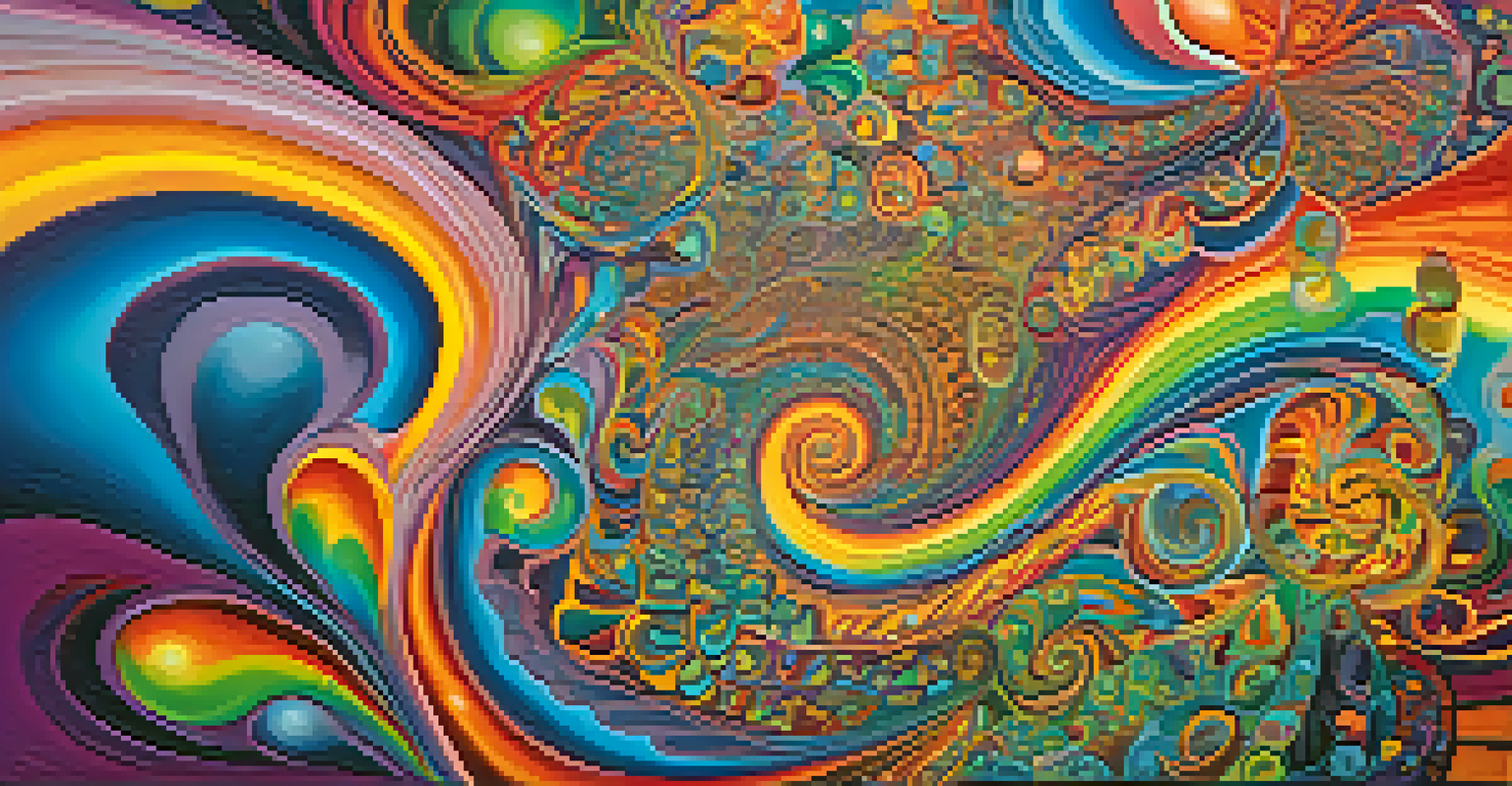Patient Experiences: Transformative Journeys in Psychedelic Therapy

Understanding Psychedelic Therapy and Its Potential
Psychedelic therapy involves using substances like psilocybin or MDMA in a controlled setting to aid mental health treatment. This innovative approach is gaining attention for its potential to address conditions like PTSD, depression, and anxiety. Patients often report profound experiences that can lead to significant shifts in perception and emotional well-being.
Psychedelics are not a panacea, but they can be a powerful catalyst for personal transformation and healing.
Unlike traditional therapies, which often focus on talk and medication, psychedelic therapy encourages patients to explore their inner worlds in a unique way. The process typically includes preparation sessions, the psychedelic experience itself, and integration discussions afterward. This structure helps patients make sense of their experiences and apply insights to their everyday lives.
Research suggests that these transformative journeys can lead to lasting changes in mental health, often after just a few sessions. For many, it's not just about alleviating symptoms; it's about nurturing a deeper understanding of themselves and their place in the world. As the stigma around psychedelics fades, more patients are eager to share their stories of transformation.
Real Stories: Patient Journeys with Psychedelic Therapy
Each patient's journey in psychedelic therapy is distinct, often resembling a personal odyssey filled with insights and healing. Take Sarah, for example, a 35-year-old who struggled with severe anxiety. During her first session, she experienced vivid imagery that helped her confront childhood traumas, leading to a breakthrough in understanding her anxiety triggers.

Another patient, Mark, found himself grappling with feelings of isolation due to a chronic illness. His psychedelic experience opened a pathway to connect with others in ways he hadn’t imagined before. Through guided introspection, he discovered the importance of community and support, which he later sought out actively.
Psychedelic Therapy's Unique Journey
This therapy invites patients to explore their inner selves, leading to profound insights and emotional healing.
These stories illustrate that psychedelic therapy is not just about the substances used; it’s about the holistic journey each patient undergoes. By sharing their experiences, patients contribute to a growing narrative that highlights the potential of psychedelics in mental health treatment and the importance of personal growth and connection.
The Role of Integration in Psychedelic Therapy
Integration is a crucial step following psychedelic experiences, as it helps patients make sense of their insights. This phase often involves discussions with therapists or support groups, where individuals reflect on their experiences and how to incorporate newfound perspectives into their daily lives. Without proper integration, the profound realizations gained during therapy might fade or become overwhelming.
The real work begins after the experience. Integration is essential for lasting change.
For instance, after her session, Sarah engaged in weekly integration circles where she shared her feelings and insights. This communal support not only deepened her understanding but also reinforced her commitment to change. Integration allows for continued healing and growth, transforming fleeting moments of clarity into lasting change.
Furthermore, integration emphasizes that the journey doesn’t end with the psychedelic experience. Instead, it’s a continuing process where patients learn to apply their insights in practical ways, fostering resilience and promoting mental well-being long after the therapy sessions have concluded.
Challenges and Concerns in Psychedelic Therapy
While the benefits of psychedelic therapy are promising, it’s important to acknowledge the challenges and concerns that accompany it. One significant issue is the potential for adverse psychological reactions during the experience. Not all individuals respond positively to psychedelics, and for some, the experience can evoke intense fear or anxiety.
Additionally, the legal status of psychedelics varies widely, which can create barriers to access for many patients seeking help. Despite growing evidence supporting their efficacy, regulatory challenges can limit research and availability, leaving many in need without the option of this transformative therapy.
Integration is Key to Healing
The integration phase helps individuals process their psychedelic experiences and apply insights to everyday life.
Lastly, there’s the concern of ensuring proper guidance and support throughout the process. It’s essential for patients to undergo psychedelic therapy in a safe, controlled environment with trained professionals. This support not only minimizes risks but also enhances the overall therapeutic experience, making it vital for the future of this promising treatment.
The Science Behind Psychedelic Therapy
The resurgence of interest in psychedelic therapy is backed by a growing body of scientific research. Studies have shown that psychedelics can promote neuroplasticity, which is the brain's ability to reorganize and form new connections. This characteristic is particularly beneficial for individuals dealing with trauma, allowing them to reframe their experiences and perceptions.
Additionally, psychedelics interact with serotonin receptors in the brain, which can lead to mood enhancement and emotional processing. This biochemical change is why many patients report feeling a sense of connectedness and euphoria during their sessions. The science provides a framework for understanding why these experiences can be so impactful.
As researchers continue to explore the therapeutic potential of psychedelics, the hope is that more concrete evidence will emerge, paving the way for broader acceptance and integration into mental health treatment. This scientific foundation is crucial for legitimizing the practice and ensuring that it becomes a reliable option for those in need.
The Future of Psychedelic Therapy: Trends and Innovations
The future of psychedelic therapy looks promising, with an increasing number of clinical trials and studies underway. Organizations and researchers are exploring various substances, including lesser-known psychedelics, to assess their therapeutic potential. This expansion could lead to a wider variety of treatment options tailored to individual needs.
Moreover, there’s a growing focus on creating safe and supportive environments for therapy. Innovations in virtual reality and guided experiences are being explored to enhance the therapeutic process, making it more accessible to those who may be apprehensive about traditional methods. These advancements could democratize access to psychedelic therapy and help reach a broader audience.
Community Support Enhances Outcomes
Building a supportive community around psychedelic therapy fosters belonging and reduces stigma, encouraging more to seek help.
As public perception continues to evolve, there’s hope for more supportive legislation and funding for research. This shift could further legitimize psychedelic therapy within the healthcare system, ultimately benefiting patients seeking innovative solutions for their mental health challenges.
Building a Supportive Community Around Psychedelic Therapy
Community plays a vital role in the journeys of those undergoing psychedelic therapy. Support groups and forums allow patients to share their experiences, challenges, and insights, fostering a sense of belonging and understanding. These networks can be invaluable for individuals navigating the complexities of their healing journeys.
Additionally, creating a culture of openness around psychedelic experiences can help reduce stigma and encourage more people to seek help. When individuals feel comfortable sharing their stories, it normalizes the conversation about mental health and alternative therapies, paving the way for broader acceptance and understanding.

Furthermore, these communities can advocate for better access to psychedelic therapy and contribute to ongoing research efforts. By uniting, patients and advocates can push for change, ensuring that this transformative approach to mental health becomes a viable option for everyone who needs it.